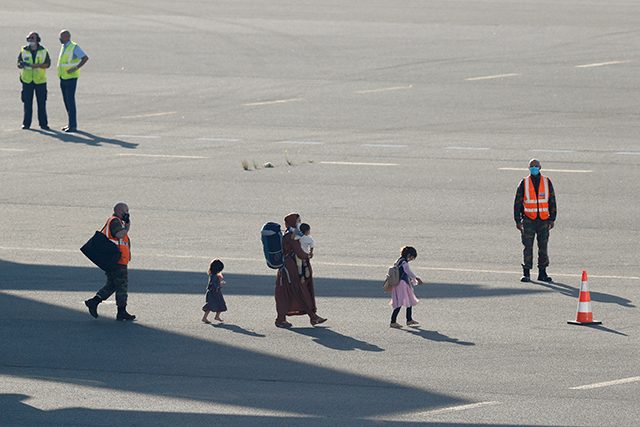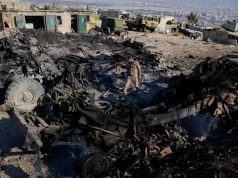
U.S. President Joe Biden said U.S. troops in Afghanistan faced mounting danger as they pushed to complete evacuations by an Aug. 31 deadline, with aid agencies warning of a looming humanitarian crisis for the population left behind.
The United States and its allies have evacuated more than 70,000 people, including their citizens, NATO personnel and Afghans at risk, since Aug. 14, the day before the Taliban swept into the capital, Kabul.
Western countries are now rushing to complete the airlift before the deadline for the withdrawal of foreign troops under an agreement struck with the Taliban last year to end America’s longest war.
Biden said U.S. troops were on pace to meet the deadline.
“The sooner we can finish, the better,” Biden said on Tuesday. “Each day of operations brings added risk to our troops.”
While the focus is now on those people trying to flee, the risk of starvation, disease and persecution is rising for the rest of the population after the chaotic exodus from Kabul airport ends, aid agencies say.
“There’s a perfect storm coming because of several years of drought, conflict, economic deterioration, compounded by COVID,” David Beasley, the executive director of the U.N. World Food Programme, told Reuters in Doha, calling for the international community to donate $200 million in food aid.
“The number of people marching towards starvation has spiked to now 14 million.”
Afghanistan’s population is estimated at 36 million though no census has been completed over more than 40 years of warfare and refugee movements.
The EU said this week it was planning a quadrupling in aid and was seeking coordination with the United Nations on delivery as well as safety guarantees on the ground.
Foreign donors pledged a projected $12 billion in civilian aid to Afghanistan over four years at a conference last November, but many made it conditional on protecting human rights and progress on peace talks.
The U.N. human rights chief said she had received credible reports of serious violations by the Taliban, including “summary executions” of civilians and Afghan security forces who had surrendered. The Taliban have said they will investigate any reports of atrocities.
Land routes
A NATO country diplomat in Kabul, who declined to be identified, said several international aid groups are desperate to get their Afghan staff to neighboring nations.
Tens of thousands of Afghans fearing persecution have thronged Kabul’s airport since the Taliban takeover, the lucky ones securing seats on flights.
The NATO country diplomat said Afghanistan’s neighbors should open their land borders to allow more people to leave.
“Iran, Pakistan and Tajikistan should be pulling out far more people using either air or land routes. It’s vital air and land routes are used at a very fast pace,” the diplomat told Reuters.
The Taliban said all foreign evacuations must be completed by Aug. 31, and asked the United States to stop urging talented Afghans to leave, while also trying to persuade people at the airport to go home, assuring them that they had nothing to fear.
“We guarantee their security,” Taliban spokesman Zabihullah Mujahid told a news conference on Tuesday.
Biden, in remarks at the White House, said the United States was racing to meet the Aug. 31 deadline as concerns mount over the threat of militant attacks.
Two U.S. officials, speaking on condition of anonymity, said there was growing concern about the risk of suicide bombings by Islamic State at the airport.
G7 commitment to Afghanistan
Leaders of the G7 major industrialized nations – Britain, Canada, France, Germany, Italy, Japan and the United States – met virtually to discuss how to complete the withdrawal and deal with the Taliban now that they have seized power.
The talks did not result “in new dates” for the end of the evacuation mission, German Chancellor Angela Merkel said, although there were intensive discussions on whether a civilian-operated airport in Kabul could be used after Aug. 31.
British Prime Minister Boris Johnson said the top condition of the G7 agreement was that militants must allow safe passage to Afghans wanting to leave the country even after that deadline.
The Afghan government collapsed as the United States and its allies withdrew troops two decades after they ousted the Taliban in the weeks after the Sept. 11, 2001, attacks on the United States by al Qaeda militants, whose leaders had found safe haven in Taliban-ruled Afghanistan.
Leaders of the Taliban, who have sought to show a more moderate face since capturing Kabul, have begun talks on forming a government that have included discussions with some old enemies, including former President Hamid Karzai.
The Taliban appointed a former Guantanamo detainee, Mullah Abdul Qayyum Zakir, as acting defence minister, the Qatari-based Al Jazeera news channel said, citing a Taliban source. Some former Afghan government officials say they have been ordered back to work.-Reporting by Reuters bureaus; Writing by Lincoln Feast, Editing by Simon Cameron-Moore









